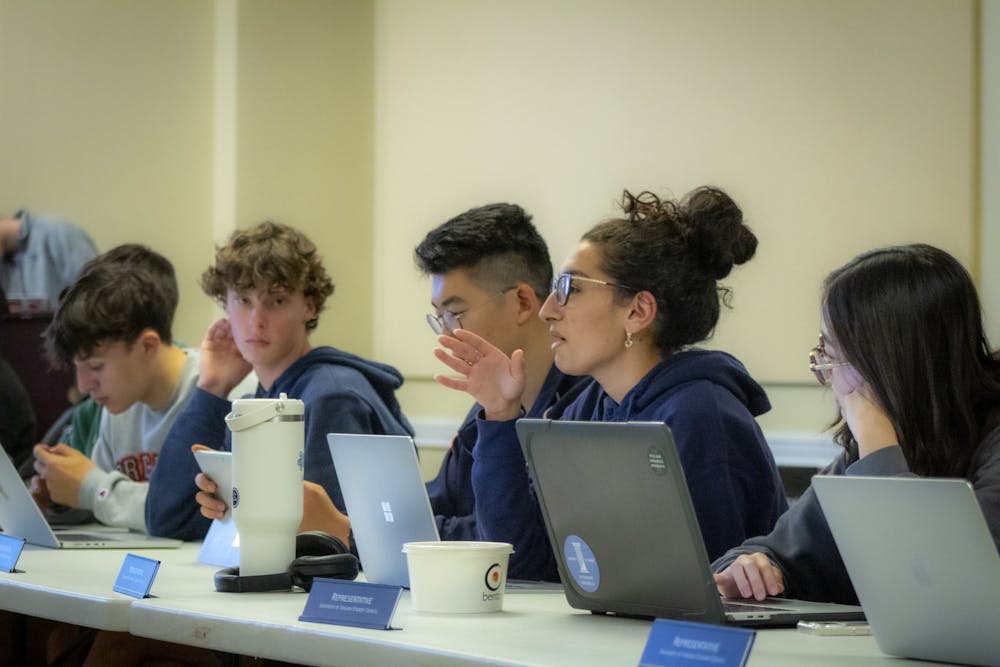Student Council’s Representative Body tabled a resolution requesting that the University’s policy office permit pepper spray at University events in response to growing safety concerns from students this past year during Tuesday’s meeting. The Representative Body ultimately voted to table the resolution in favor of reaching out further to other members of the University, including representatives from its policy office, for input.
Brian Ng, first-year College student representative, said he wrote and proposed the resolution as a response to his first-year constituents voicing concerns about their safety and referenced recent safety concerns, including the attempted abduction of a University student in October.
Ng said his resolution also intends to have the University promote using pepper spray for self-defense, adding that he thinks the University should sell pepper spray in the bookstore.
“I think it's important for us to show support for the people we represent, our fellow students, and show that we are there for them,” Ng said.
According to Ng, current University policy allows pepper spray to be kept in dorms, but does not permit it at University-sanctioned events like football games or Lighting of the Lawn. Ng said other Virginia public schools, including Virginia Tech and Virginia Commonwealth University, allow, and even encourage, pepper spray at university events. He presented policy from VCU’s website that outlines the uses of pepper spray and advises students to carry pepper spray with them when walking alone.
Ng said that while he reached out to Housing and Residence Life, who worked with the University’s policy office when it changed the policy to allow pepper spray in dorms, even those he spoke to within the organization were unsure about all of the specifications of the University’s policy.
First-year College student Lillianne McMinn shared her own experience feeling unsafe at the University during the public comment portion of Tuesday’s meeting. McMinn said that herself and two of her friends were followed into and harassed in Clemons Library by an older man unaffiliated with the University, resulting in the group locking themselves in the restroom and waiting for police to arrive.
McMinn said that because the event happened late at night, she and her friends felt unsafe leaving out of risk of being confronted by the man. Even after police escorted the man out, McMinn and her friends decided to spend the night in the library and wait until sunrise to leave.
“There are many people who refuse to go to the library alone at night because of the safety concerns for getting home,” McMinn said. “No one wants to have to sacrifice their safety for the sake of their education. Encouraging students safety on Grounds means encouraging the access to basic self-defense such as pepper spray.”
The University Transport Service offers a “Night Pilot” bus route from 10 p.m. to 2 a.m. The University’s “Safe Ride” system also provides on-call van transportation from 12:30 a.m. to 7:30 p.m. Sunday through Wednesday and 2 a.m. to 7:30 a.m. Thursday through Saturday. Students can call 434-242-1122 or send a request through the Transloc OnDemand app. These services were not mentioned at Tuesday’s meeting.
While the resolution adopted minor amendments to clarify its language, other concerns from representatives centered around the lack of specificity and clarity with the University’s existing policy on pepper spray.
Ng said he could speak with University leaders to make clarifications after the resolution passed, but graduate student representative Benvin Lozada said the University’s policy office and public safety office should be contacted before moving forward.
“I think this resolution might benefit from being tabled this meeting so that we can get more time to talk to folks on policy [and] safety to figure of where this policy is enforced precisely so that we can target this in the most effective way to make sure that this change really gets enacted,” Lozada said.
Ng said he wanted the resolution to pass during the meeting out of a need to act with urgency to protect student safety. Second-year College representative Imane Akhanous, however, agreed that more departments affected by the policy, such as University Athletics, should be contacted before passing legislation.
“I think it would be better if you revise [the resolution] so that we can all vote confidently on a bill that we can fully back and completely agree with,” Akhanous said. “That way as soon as the first [General Body] meeting of the semester occurs, we can vote on legislation that is precise and concise and says everything that needs to be said with the research backing it.”
The motion to table passed unanimously. Student Council will revisit the resolution during its first General Body meeting next semester, with the date to be announced.







